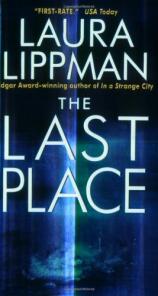The Last Place
Review
The Last Place
Tess Monaghan is in her seventh book and she's in trouble from page
one --- but her creator Laura Lippman isn't. Lippman is an author
in full control of her characters, her story and her craft. As a
lifelong mystery-lover, I get a certain feeling when I crack open a
book like this and can immediately sense that I'm in good, sure
hands with the author. I relax into that fictional world and let
go, secure in the knowledge that I'll be taken places I've never
been before, probably wouldn't have the courage to go alone and
will return enriched by the experience. THE LAST PLACE is that kind
of book.
So Tess gets arrested and goes before a judge. It is a kind of
vigilante-justice situation, where her "victim" was more wrong than
she. Still, Tess is sentenced to a six-month course in anger
management with a shrink. These therapy sessions run in
counterpoint to the main plot, a sort of ongoing character
commentary that could easily have been overdone. A lesser author
wouldn't have been able to resist. But for Lippman it's simply
there, a part of this private investigator's life. For Tess, it is
certainly not the most important part and insights are noted,
tucked away in case they're needed later. She grows but it's no big
deal --- she just keeps on keeping on.
That first bad guy --- the one who managed to turn himself into a
victim --- may have been merely a nuisance, but there's a real
sicko out there. In fact, some of the most outstanding writing in
THE LAST PLACE is in sections that show us his view of the world.
It's warped but atmospheric; he's twisted, poisoned by longing ---
and the object of his longing is Tess Monaghan. She will not know
this until very late in the book, but we know and we fear for
her.
Tess has been hired by a coalition of humanitarian organizations to
investigate a list of six deaths --- unsolved murders --- that are
suspected to be rooted in domestic violence. All occurred not in
the City of Baltimore, but in Baltimore County; all the cases are
supposed to have been chosen at random by a volunteer at one of the
participating organizations. Tess's job as private investigator is
to go deeper into the deaths than the police in their various
jurisdictions have done and to find the domestic violence link the
police may have ignored. The coalition will then go to their
legislators to ask for a spotlight on domestic violence and for new
laws with bigger teeth. Initially, Tess is thrilled to take the
case, which seems to dovetail nicely with the goals of her therapy;
she thinks, "At last I'll be one of the good guys." Uh-huh.
During her investigation she picks up a sidekick, a former state
toll road cop who is now retired on disability and who is obsessed
with solving one of the cases himself. He is a fascinating
character to pair with forthright, aggressive Tess, who begins to
occasionally glimpse a reason she might actually need to be in
anger management. And on they go, while the sicko separately
continues to tell his side of the tale, all unknown to Tess. For
the reader, the suspense ratchets ever higher.
While the plot expands, contracts, cracks open again and now and
then doubles back on itself in convolutions only a master
storyteller could handle, there are some wonderful moments where
one can read for the sheer pleasure of the English language.
Bearing in mind that most of the book is from Tess Monaghan's point
of view and observations on the part of the author are always
consistent with Tess's character, consider the economy and
precision of the following: "It was the kind of fresh spring day
that made everyone but T.S. Eliot feel hopeful"; "Julie was a heavy
smoker. Being inside the house was like crawling into a pack of
Marlboros"; "... her manner was slick as marble. Polite but hard,
with nothing to grasp"; "Rationalization [is] what really separates
humans from the rest of the animal kingdom. It's the opposite of
Darwinism. Animals do what they have to do to survive, but it's all
instinct. Humans do what they want to do, then work backward,
trying to make a case for why it was essential to their
survival."
That's the merest sample. There's much more and it all fits within
the point of view. You don't get, say, a ten year-old
child-character making narrative comments in Shakespearean language
-- a device that is much praised by some critics, but it doesn't
sit well with me.
When the language is this good and you can't guess the identity of
that sicko guy with the scary yearnings no matter how often the
plot turns back on itself, you have a book that ends too soon no
matter how long it is. That's why I'm glad now that I somehow
missed reading last year's Tess Monaghan book, IN A STRANGE PLACE,
in hardcover. How could I have done that? It was a New York Times
notable book-of-the-year --- shame on me. But never mind. IN A
STRANGE PLACE is now out in paperback, so I'll buy it and prolong
my Baltimore-based reading pleasure.
That reminds me: The Mayor of Baltimore recently gave Laura Lippman
the city's Award for Excellence in Literature. I expect the Mayor
wanted to be sure she doesn't forget her roots, because this
mystery author is poised on the edge of flight --- into the high,
thin regions where bestsellers dwell. Laura Lippman is certainly
going to soar.
Reviewed by Ava Dianne Day on January 22, 2011




